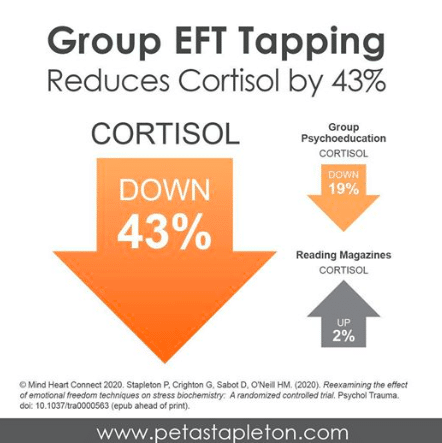Clinical research for EFT Tapping provides measurable evidence of what many of us already know, Tapping works! What’s even more impressive, is when researchers replicate these landmark studies. Science shines when a totally different group of people in other parts of the world show similar (if not better!) results.
 That’s what Dr. Peta Stapleton of Bond University in Australia did recently when she replicated Dawson Church’s famous 2012 cortisol study. Peta’s study results have also been published in the respected APA Journal, which is a huge win for the field too. The only change she made to the original individually delivered trial was that she offered the EFT Tapping sessions in groups instead – and she achieved a 43% reduction in cortisol in 1 hour of EFT by doing this. Amazing! Read the full study abstract here, but I’ll include the technicals below for those who like me love to explore the science.
That’s what Dr. Peta Stapleton of Bond University in Australia did recently when she replicated Dawson Church’s famous 2012 cortisol study. Peta’s study results have also been published in the respected APA Journal, which is a huge win for the field too. The only change she made to the original individually delivered trial was that she offered the EFT Tapping sessions in groups instead – and she achieved a 43% reduction in cortisol in 1 hour of EFT by doing this. Amazing! Read the full study abstract here, but I’ll include the technicals below for those who like me love to explore the science.
Reexamining the effect of emotional freedom techniques on stress biochemistry: A randomized controlled trial.
Stapleton P1, Crighton G1, Sabot D1, O’Neill HM2.Psychol Trauma. 2020 Mar 12.
OBJECTIVE: In a direct replication of Church, Yount, and Brooks (2012), this study examined changes in stress biochemistry and psychological distress symptoms. They allocated fifty-three participants randomly to one of three 60-min group interventions: Emotional Freedom Techniques (EFT), psychoeducation (PE), and no treatment (NT). The Symptom Assessment-45 (SA-45) was used to assess psychological distress symptoms.
METHOD: Researchers administered Salivary cortisol assays 30 min pre- and postintervention to test cortisol levels. The original study by Church et al. indicated the EFT group showed statistically significant improvements in anxiety (-58.34%, p < .05), depression (-49.33%, p < .002), overall severity of symptoms (-50.5%, p < .001), and symptom breadth (-41.93%, p < .001). The group also experienced a significant decrease in cortisol (-24.39%) compared to the PE group (-14.25%) and NT group (-14.44%).
RESULTS: The present results indicated the EFT group experienced a significant decrease in cortisol greater than the original study (-43.24%, p < .05), but these results were not mirrored by subjective reports of psychological distress. The EFT group reduction in cortisol was significantly different from that of the PE group (-19.67%), and as expected, the posttreatment cortisol level detected among the EFT group was lower than that of the NT group (2.02%); however, there was not a statistically significant difference between the 2 groups. Additionally, there were no significant improvements in cortisol reduction among the NT and PE groups.
CONCLUSIONS: Findings support the original study. They indicated EFT to be an efficient and effective brief treatment for reducing biological markers of stress.


